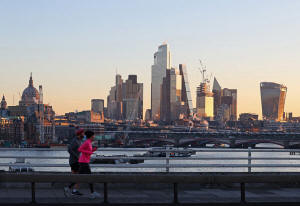UK businesses keep up recovery but prices still a worry, PMI shows
 Send a link to a friend
Send a link to a friend
 [March 21, 2024] LONDON
(Reuters) -British businesses kept up their recovery from recession this
month but stubborn price pressures could bolster the Bank of England's
wait-and-see approach to interest rates, a survey showed Thursday. [March 21, 2024] LONDON
(Reuters) -British businesses kept up their recovery from recession this
month but stubborn price pressures could bolster the Bank of England's
wait-and-see approach to interest rates, a survey showed Thursday.
Closely watched by the BoE ahead of its 1200 GMT interest rate decision,
the S&P Global Composite Purchasing Managers' Index (PMI) inched down to
52.9 in March from 53.0 in February.
A Reuters poll of economists had pointed to a reading of 53.1. Despite
the slight fall, the index notched up a fifth month above the 50
threshold for growth and signaled Britain is on track to exit the
shallow recession it entered in the second half of last year.
Survey compiler S&P Global said economic output was likely to expand
around 0.25% in the first quarter, based on the PMI's previous track
record, similar to the consensus of 0.2% among economists polled by
Reuters.
The readings contrasted with those of France and Germany, where the PMI
signaled a continued downturn in their private sector economies.
"The fact that the economy's contraction last year looks increasingly
likely to have been short-lived is one reason why the (BoE) probably
won't be in a rush to cut interest rates just yet," said Martin Beck,
chief economist adviser to the EY ITEM Club consultancy.
"Another is concern that underlying inflationary pressures haven't yet
eased sufficiently. March's survey is unlikely to calm that worry," Beck
said.
The composite PMI - which BoE officials had access to ahead of their
rate decision - showed no sign of a further rapid easing of inflation
pressure.
While its gauge of input prices eased back slightly from February's
six-month high, for selling prices it rose to the highest level since
July 2023.

[to top of second column] |

Joggers run over Waterloo Bridge, with skyscrapers of the City of
London business district seen behind, at sunrise, as cold weather
continues, in London, Britain, January 19, 2024. REUTERS/Toby
Melville/File Photo

"March's PMI warns of elevated underlying price pressures which will
likely add to calls for restraint in any pivot to lower interest
rates until there are firm signs of lower wage growth," S&P Global's
chief business economist Chris Williamson said.
Official data on Wednesday showed consumer price inflation fell to
3.4% in February from 4.0% in January, the lowest reading since
September 2021. While slowing, services inflation remains stubbornly
high.
The PMI for the services sector fell to 53.4 in March from 53.8 in
February, a three-month low and against expectations for an
unchanged reading. Its measures of employment and new orders cooled,
the latter reaching the lowest since November.
The manufacturing sector came within a whisker of ending its
20-month downturn in March. The factory PMI rose to 49.9 - just
below the 50 no-change mark - from 47.5, while output turned
positive for the first time in more than a year.
However, the survey's gauges of industrial input costs hit a 1-year
high, while selling prices rose at the fastest rate since May.
(Reporting by Andy Bruce; Editing by Toby Chopra)
[© 2024 Thomson Reuters. All rights
reserved.]
This material may not be published,
broadcast, rewritten or redistributed.
Thompson Reuters is solely responsible for this content. |